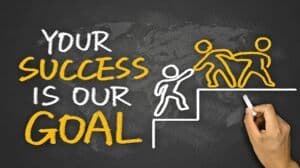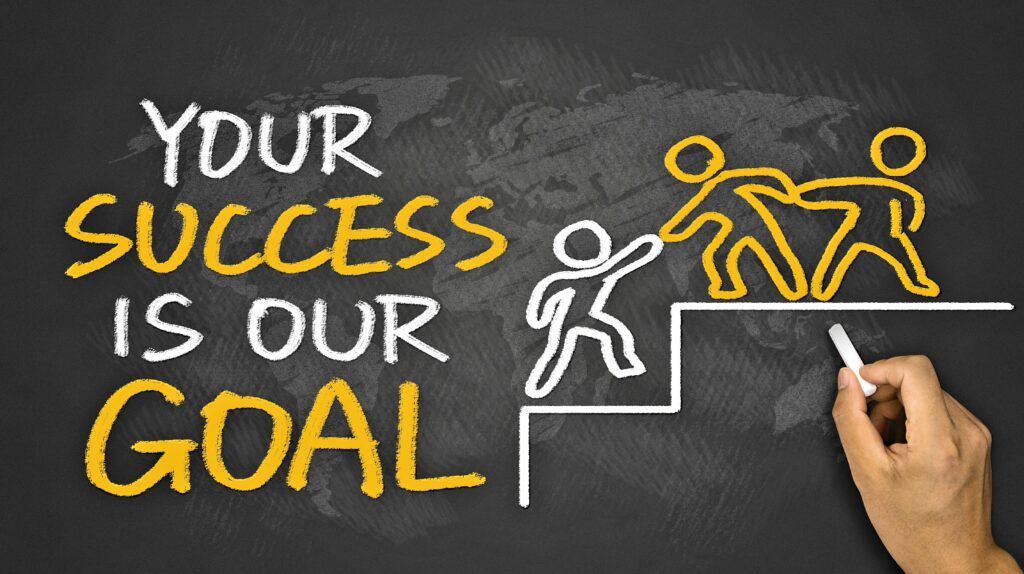
In this post (and this series) I’m going to show you how to create the most effective goals, which maximize your personal growth and help you to achieve everything that you deeply want to achieve.
In fact, these are the same techniques that my high-achieving coaching clients use and that I have also used with great personal success.
This blog series will help you with your personal growth and/or leadership development. In this introduction, I briefly introduce myself, explain why goal-setting is critical to anyone who wants to maximize their individual or organizational success and finally, ask you some questions to provoke your “goal-setting mental mindset”.
First, let me tell you a little about me. Helping individuals and organizations become impactful and productive in their mission is what I feel with passion, that I am called to do. I fulfill this calling in many roles: as Pastor, Motivational Speaker, Life Coach and even as a Youth Basketball Coach (maybe my most significant role because I am helping to shape young lives). So for you and I to connect on our respective journeys through this series means a lot to me, and I want you to know that I take your time and what you are pursuing very seriously.
WE ARE IN THE PERSONAL DEVELOPMENT AGE
Peter Drucker -considered “the father” of modern management- said, “When the history of our time is written…it is likely the most important event those historians will see is not technology, not the Internet, not e-commerce. It is an unprecedented change in the human condition. For the first time, a substantial and rapidly growing numbers of people have choices. For the first time, they will have to manage themselves. And society is totally unprepared for it.” (Leader to Leader Journal, Managing Knowledge Means Managing Oneself, Peter Drucker, Spring 2000)
Although that quote is from seventeen years ago, it holds as much truth today as when Drucker first wrote it. We can no longer rely on past paradigms or follow traditional customs to attain success.
A high school diploma, college degree, and graduate or professional degree are proven to increase individual income and professional success. But, even they alone cannot be relied upon to predict our professional success. More than ever individuals will have to learn to develop their personal leadership skills and make decisions to shape their destiny.
GOAL-SETTING IS ONE OF THE MOST EFFECTIVE PERSONAL GROWTH STRATEGIES
One of the most significant practices to determine your desired outcome and ensure success is setting goals. Goals are, simply dreams with deadlines.
In this series, I will discuss further why goals are significant and a detailed plan of how you can use a goal-setting process to become great in every area of your life. A goal is a specific outcome that you decide to complete by a certain point in time. Or, more simply, a goal is a dream with a deadline
One of the most common approaches to goal-setting is the method of setting SMART goals. It is an acronym for Specific, Measurable, Achievable, Realistic and Time-Bound. The SMART goals technique is a robust method to increases the likelihood that you achieve your goals and to ensure that they meet certain, necessary criteria. However, you have to be conscious of not focusing inordinately on goal-achievement and not enough on what you target. Attaining meaningful, long-term success requires you develop a sense of awareness of why the goals are significant to you. There is no greater feeling of frustration to achieve something and then realize that you never really had any deep connection to what you set out to accomplish. My aim is to help provoke deep reflection so that you become more aware and conscious of your motivations and desired outcomes.
PERSONAL GROWTH IS NOT EASY
We will even deal honestly with the realities of why personal growth is not easy. Marshall Goldsmith deals with this issue in his book, Triggers: Creating Behavior That Lasts, Becoming the Person You Want to Be, and warns us that, “Regret, is the emotion we experience when we assess our present circumstances and reconsider how we got here.” He also asks a fundamental question, “Why don’t we become the person we want to be?”
It is a question that you can ask yourself: Are you presently or are you becoming the person that you want to be? If not, what are the challenges that you are facing?”
Do you find yourself making any of the following statements?
• I don’t have time to accomplish what I would like to.
• I am so busy that I can’t even enjoy life.
• The people close to me want me to spend more time with them. But how can I possibly find more time for anything?
• At the end of each week, I am tired but I do not feel like I accomplished anything.
If you can say yes to finding yourself making any of the statements above, it is time to develop a long-term perspective of your life. The very first step, before you even get to goal-setting is to develop clarity about your long-term life perspective. Once you contemplate a long-term vision, determining your goals in the short-term becomes much easier. For example: spend some time thinking about:
• Your life purpose (or if that is too daunting think of it as your long-term mission)
• Create a vision for your life (the details of what you would like your life to look like 10 years from now)
One, you become clear on your long-term mission, vision, and values, then you begin to set goals to help you accomplish the things that matter the most to you and that will bring a sense of fulfillment in your life.
This blog series will help you whether you have engaged in goal setting or not. And even if you have read goal-setting books or courses and feel as though you have not been successful, I am confident that this series will help lead you to some significant breakthroughs.
We discussed what this blog series is. Let me very briefly say what it is not. It is not a series on how to get rich quick, become famous overnight or how to acquire fancy material possessions just for the sake of it. There, is always a need for a reminder that we should develop a sense of personal consciousness and not rely merely on following the latest style or fad. It is not a rejection of that which is material or an admonition against abundance. It is a plea for balance.
We may not have met in person, but I believe with all of my being that, whatever stage you are on your journey, you have incredible God-given potential that you haven’t fully realized. The best is yet to come! Cheers to you as you journey from “Goals to Greatness.”
